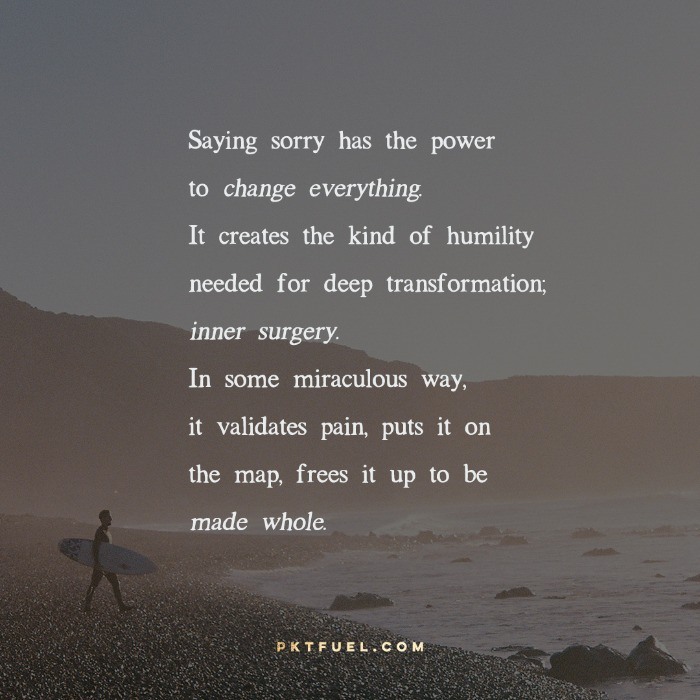We live in a culture corroded by shame. Shame keeps us silent; it keeps us hiding our true selves in the dark. It’s motivated by fear and scarcity. Shame is the belief that something at the very core of our being is defective, wrong, out of order: who I am is faulty. And when we believe we are faulty, the last thing we want to do is reveal our brokenness to a world and people who will exploit it. It keeps us from connection. So we don’t say sorry. Or we say it too much. We avoid being seen and open at our most vulnerable.

Powerful, two minute reads that have helped change the script in thousands of people's lives.


To which I reply: “No you’re not, you’re just learning. This is how you learn. We all go through it. Even Mummy and Daddy!”
We don’t say sorry as much as we should because we feel it would be an admission of our “not enoughness.” We need to address our sense of self and security. I could write devotions on that every day for a year! So, can we work on the belief that we are enough for the next couple of sentences? (because we are, we just need to believe it more.)
Saying sorry has the power to change everything. It paves the way for healing; ours and the person we've hurt. It creates the kind of humility needed for deep transformation, inner surgery. In some miraculous way, it validates pain, puts it on the map, frees it up to be made whole. There are other devotions I could write about forgiving and accepting, but this one is about being and saying sorry. Imagine how different our world would be if instead of walking away in pride, anger, and shame, we faced the pain we’ve created, been complicit in (willingly or not), with humility and asked for forgiveness?
I’m sorry that happened to you.
I’m sorry I said those horrible things.
I’m sorry I stood by and did nothing.
I’m sorry I didn’t understand.
I’m sorry I did those things to you.
We look at the world and see all its pain and wonder how on earth we could forgive those who have brought it upon us. But I think it starts with us. You. Me. Taking responsibility, rising up in humility and practicing the first step in the process of forgiveness and healing:
“I’m sorry.”
The pain we could spare each other if we denied shame it’s power and spoke up in our guilt!
Jesus said:
“If you are presenting a gift before the altar in the temple and suddenly you remember a quarrel you have with a fellow believer, leave your gift there in front of the altar and go at once to apologize with the one who is offended.” (Matthew 5:23-24).
Because relationship trumps ceremony each and every time.
Written by Liz Milani


Great truths there my bounded on the “sorry I wasn't there for you”. Forgiveness from a Christian point of view is described so well by you. I found myself thinking about how I as a woman tend to say sorry a lot as in “sorry I'm taking up space” “sorry if this is boring” sorry sorry sorry. These are the times as Christian women we need to forgive ourselves for falling into the patriarchal ‘sorry' box. And because woman overuse that word maybe it's harder for us to use it as Jesus intended. Equally contemporary white men in our society must find this a challenge when the secular world says men needn't apologise when bucks are passed by corporate institutions as in the royal commission on abuse by institutions created to protect people. So there's the personal journey, (I choose not to take communion if I have an issue of forgiveness to a friend) & there's the political as in – as a Christian woman I will not apologise for being visible and having an opinion. Thank you for your wisdom and letting your words take me in a thought journey this morning.